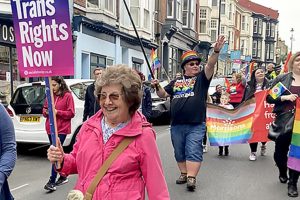The British government on Tuesday insisted it is still “guided by science” following the criticism that senior ministers had ignored the advice of experts three weeks ago for tougher restrictions to cut rising coronavirus infections.
Health secretary Matt Hancock told lawmakers the government had not acted on most elements of September 21 shortlist of possible virus interventions citing the possibility of economic fallout as the reason.
A panel of scientific experts had set out the five-strong set of potential measures “for immediate introduction”, and included a so-called circuit-breaker lockdown to cut transmission rates.
“We make decisions that are guided by the science, taking into account all of the different considerations that we need to look to,” he told MPs as they prepared to vote on the latest, more limited, set of measures unveiled by Prime Minister Boris Johnson on Monday.
Johnson announced a three-tiered system categorising areas of England by rates of infection, to try to simplify a complex web of local restrictions.
The northwest city of Liverpool — the only place put into the highest category — will see a ban on household mixing and pub closures from Wednesday for at least four weeks.
However, England’s Chief Medical Officer Chris Whitty — flanking Johnson at a Downing Street news conference Monday evening — warned he was “not confident” the measures could reverse an upward trend that has seen COVID-19 cases quadruple in the last three weeks.
He urged local leaders in the most-affected areas to go further.,”I am not confident, and nor is anybody confident, that the tier three proposals for the highest rates… if we did the absolute base case, and nothing more, would be enough to get on top of it,” Whitty said.
“There’s a lot of flexibility in the tier three level for local authorities… so that they can do significantly more than the absolute base because the base will not be sufficient.”
Johnson’s announcement was also then further undermined by the emergence of the details of the government’s Scientific Advisory Group for Emergencies (SAGE) advice.
Alongside the circuit-breaker measure, they had recommended closing bars, restaurants, cafes, gyms and personal services like hairdressers, banning different households from mixing in homes and switching all university and college tuition online.
However, the prime minister adopted only one of the five recommendations — urging people to work from home.
His spokesman said Tuesday that Sage itself advises considering the economic impact of any measures and associated harms, noting: “and that’s exactly what the prime” minister, the chancellor and colleagues did”.
“The interventions which we have made are having an effect,” he added.
But the main opposition Labour party said the government’s failure to act was alarming and raised questions about the credibility of its latest plan to curb the virus’ spread.
“The overall question for us is not whether they go too far but whether the overall package in fact goes far enough,” Labour’s health spokesman Jonathan Ashworth said.
“I fear further action is going to be needed.”
Johnson has been heavily criticised, not least for being too slow to move to a national lockdown in its early stages.
Britain’s death toll of more than 43,000 is the worst in Europe. Nearly 14,000 new cases were reported across Britain on Monday, with 50 further deaths.
Hospital admissions are now higher than when the national lockdown was introduced on March 23.
Businesses, Conservative MPs and right-wing newspapers have urged Johnson to resist another national lockdown because of the effect on the economy.
SAGE member John Edmunds, an epidemiologist, said tougher restrictions needed to be in place “as fast as possible”.
“I suspect we will see very stringent measures coming in place throughout the UK at some point but it will be too late again,” he told BBC radio.






